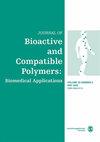聚乙亚胺接枝两亲共聚物的发展:细胞毒性和复合DNA能力的评价
IF 2.2
4区 生物学
Q3 BIOTECHNOLOGY & APPLIED MICROBIOLOGY
引用次数: 1
摘要
聚乙烯亚胺(PEI)是一种应用最广泛的基因传递阳离子聚合物。这种高分子量的聚合物可以在市面上买到,它效率很高,但也有很强的细胞毒性。利用基于低分子量PEI的非线性结构降低电荷密度是一种生产更安全的dna载体的有前途的方法。本文研究了一组不同组成的含疏水生物相容性骨架和LMW线性PEI (lPEI)接枝的阳离子接枝共聚物。通过凝胶阻滞实验、zeta电位测量和动态光散射分析了这些材料的自组装和DNA络合行为。共聚物在水中形成带正电的粒子,平均粒径在270 ~ 377nm之间。将它们添加到无血清培养基中的DNA中后,这些颗粒获得负/近中性电荷,并根据N/P比增大大小。与25 kDa lPEI相比,所有共聚物的细胞毒性均降低,但转染效率降低。这一结果表明,阳离子片段太小,即使使用几个移植物和引入疏水结构域,也无法充分凝聚DNA并促进细胞摄取。研究结果表明,较高的疏水性和接枝密度可以增强共聚物与DNA的相互作用。这些趋势可以指导进一步的结构修改,在此基础上寻找有效和安全的载体。本文章由计算机程序翻译,如有差异,请以英文原文为准。
Development of poly(ethyleneimine) grafted amphiphilic copolymers: Evaluation of their cytotoxicity and ability to complex DNA
Poly(ethyleneimine) (PEI) is one of the most widely used cationic polymers for gene delivery. The high molecular weight polymer, which is commercially available, is highly efficient but also very cytotoxic. The reduction in charge density by using nonlinear architectures based on low molecular weight (LMW) PEI is a promising approach to produce safer DNA-vectors. Herein, a group of cationic graft copolymers with different composition containing a hydrophobic biocompatible backbone and LMW linear PEI (lPEI) grafts obtained by ring opening polymerization and click chemistry was studied. The self-assembly and DNA complexation behavior of these materials was analyzed by the gel retardation assay, zeta potential measurements, and dynamic light scattering. The copolymers formed positively charged particles in water with average sizes between 270 and 377 nm. After they were added to DNA in serum-free medium, these particles acquired negative/near-neutral charges and increased in size depending on the N/P ratio. All copolymers showed reduced cytotoxicity compared to the 25 kDa lPEI used as reference, but the transfection efficiency was reduced. This result suggested that the cationic segments were too small to fully condense the DNA and promote cellular uptake, even with the use of several grafts and the introduction of hydrophobic domains. The trends found in this research showed that a higher degree of hydrophobicity and a higher grafting density can enhance the interaction between the copolymers and DNA. These trends could direct further structural modifications in the search for effective and safe vectors based on this polycation.
求助全文
通过发布文献求助,成功后即可免费获取论文全文。
去求助
来源期刊

Journal of Bioactive and Compatible Polymers
工程技术-材料科学:生物材料
CiteScore
3.50
自引率
0.00%
发文量
27
审稿时长
2 months
期刊介绍:
The use and importance of biomedical polymers, especially in pharmacology, is growing rapidly. The Journal of Bioactive and Compatible Polymers is a fully peer-reviewed scholarly journal that provides biomedical polymer scientists and researchers with new information on important advances in this field. Examples of specific areas of interest to the journal include: polymeric drugs and drug design; polymeric functionalization and structures related to biological activity or compatibility; natural polymer modification to achieve specific biological activity or compatibility; enzyme modelling by polymers; membranes for biological use; liposome stabilization and cell modeling. This journal is a member of the Committee on Publication Ethics (COPE).
 求助内容:
求助内容: 应助结果提醒方式:
应助结果提醒方式:


